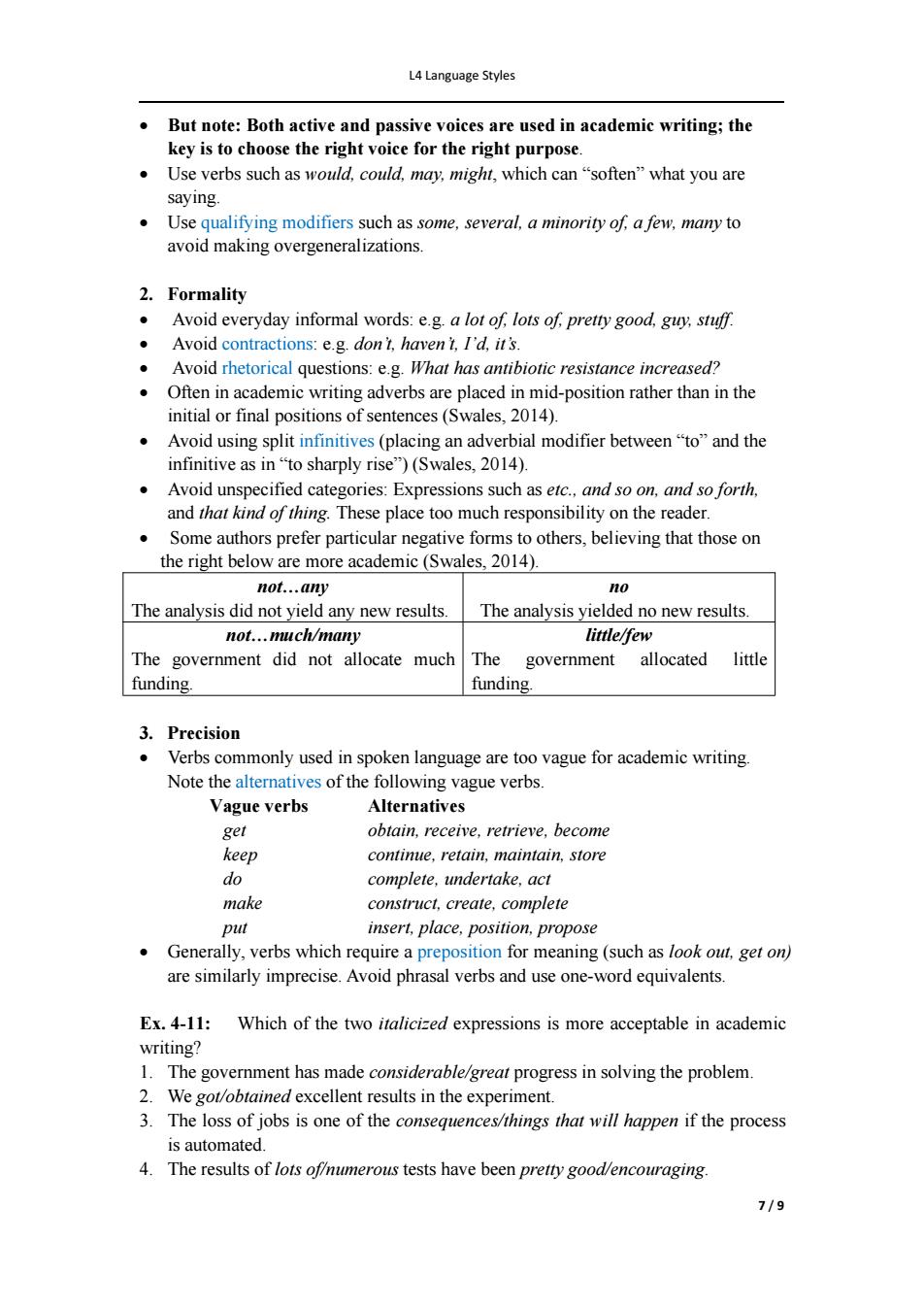正在加载图片...

L4 Language Styles ● But note:Both active and passive voices are used in academic writing;the key is to choose the right voice for the right purpose Use verbs such as would,could,may,might,which can"soften"what you are saying. Use qualifying modifiers such as some,several,a minority of,a few,many to avoid making overgeneralizations. 2.Formality Avoid everyday informal words:e.g.a lot of,lots of,pretty good,guy,stuff. Avoid contractions:e.g.don't,haven t,I'd,it's. Avoid rhetorical questions:e.g.What has antibiotic resistance increased? Often in academic writing adverbs are placed in mid-position rather than in the initial or final positions of sentences(Swales,2014). ● Avoid using split infinitives(placing an adverbial modifier between"to"and the infinitive as in"to sharply rise")(Swales,2014). Avoid unspecified categories:Expressions such as etc.,and so on,and so forth, and that kind of thing.These place too much responsibility on the reader. Some authors prefer particular negative forms to others,believing that those on the right below are more academic(Swales,2014). not...any 10 The analysis did not yield any new results. The analysis yielded no new results. not...much/many little/few The government did not allocate much The government allocated little funding funding. 3.Precision Verbs commonly used in spoken language are too vague for academic writing. Note the alternatives of the following vague verbs. Vague verbs Alternatives get obtain,receive,retrieve,become keep continue,retain,maintain,store do complete,undertake,act make construct,create,complete put insert,place,position,propose Generally,verbs which require a preposition for meaning(such as look out,get on) are similarly imprecise.Avoid phrasal verbs and use one-word equivalents. Ex.4-11: Which of the two italicized expressions is more acceptable in academic writing? 1.The government has made considerable/great progress in solving the problem. 2.We got/obtained excellent results in the experiment. 3.The loss of jobs is one of the consequences/things that will happen if the process is automated. 4.The results of lots of/numerous tests have been pretty good/encouraging. 7/9L4 Language Styles 7 / 9 But note: Both active and passive voices are used in academic writing; the key is to choose the right voice for the right purpose. Use verbs such as would, could, may, might, which can “soften” what you are saying. Use qualifying modifiers such as some, several, a minority of, a few, many to avoid making overgeneralizations. 2. Formality Avoid everyday informal words: e.g. a lot of, lots of, pretty good, guy, stuf . Avoid contractions: e.g. don’t, haven’t, I’d, it’s. Avoid rhetorical questions: e.g. What has antibiotic resistance increased? Often in academic writing adverbs are placed in mid-position rather than in the initial or final positions of sentences (Swales, 2014). Avoid using split infinitives (placing an adverbial modifier between “to” and the infinitive as in “to sharply rise”) (Swales, 2014). Avoid unspecified categories: Expressions such as etc., and so on, and so forth, and that kind of thing. These place too much responsibility on the reader. Some authors prefer particular negative forms to others, believing that those on the right below are more academic (Swales, 2014). not…any The analysis did not yield any new results. no The analysis yielded no new results. not…much/many The government did not allocate much funding. little/few The government allocated little funding. 3. Precision Verbs commonly used in spoken language are too vague for academic writing. Note the alternatives of the following vague verbs. Vague verbs Alternatives get obtain, receive, retrieve, become keep continue, retain, maintain, store do complete, undertake, act make construct, create, complete put insert, place, position, propose Generally, verbs which require a preposition for meaning (such as look out, get on) are similarly imprecise. Avoid phrasal verbs and use one-word equivalents. Ex. 4-11: Which of the two italicized expressions is more acceptable in academic writing? 1. The government has made considerable/great progress in solving the problem. 2. We got/obtained excellent results in the experiment. 3. The loss of jobs is one of the consequences/things that will happen if the process is automated. 4. The results of lots of/numerous tests have been pretty good/encouraging